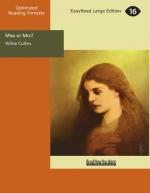Knowing where he could procure the loan, he was by no means equally sure of being able to find the security on which he could borrow the money. Living up to his income; having no expectations from any living creature; possessing in landed property only some thirty or forty acres in Somersetshire, with a quaint little dwelling, half farm house, half-cottage, attached—he was incapable of providing the needful security from his own personal resources. To appeal to wealthy friends in the City would be to let those friends into the secret of his embarrassments, and to put his credit in peril. He finished his breakfast, and went back to Austin Friars—failing entirely, so far, to see how he was to remove the last obstacle now left in his way.
The doors were open to the public; business had begun. He had not been ten minutes in his room before the shipping-clerk knocked at the door and interrupted him, still absorbed in his own anxious thoughts.
“What is it?” he asked, irritably.
“Duplicate Bills of Lading, sir,” answered the clerk, placing the documents on his ma ster’s table.
Found! There was the security on his writing-desk, staring him in the face! He dismissed the clerk and examined the papers.
They contained an account of goods shipped to the London house on board vessels sailing from Smyrna and Odessa, and they were signed by the masters of the ships, who thereby acknowledged the receipt of the goods, and undertook to deliver them safely to the persons owning them, as directed. First copies of these papers had already been placed in the possession of the London house. The duplicates had now followed, in case of accident. Richard Turlington instantly determined to make the duplicates serve as his security, keeping the first copies privately under lock and key, to be used in obtaining possession of the goods at the customary time. The fraud was a fraud in appearance only. The security was a pure formality. His marriage would supply him with the funds needed for repaying the money, and the profits of his business would provide, in course of time, for restoring the dowry of his wife. It was simply a question of preserving his credit by means which were legitimately at his disposal. Within the lax limits of mercantile morality, Richard Turlington had a conscience. He put on his hat and took his false security to the money-lenders, without feeling at all lowered in his own estimation as an honest man.
Bulpit Brothers, long desirous of having such a name as his on their books, received him with open arms. The security (covering the amount borrowed) was accepted as a matter of course. The money was lent, for three months, with a stroke of the pen. Turlington stepped out again into the street, and confronted the City of London in the character of the noblest work of mercantile creation—a solvent man.*
The Fallen Angel, walking invisibly behind, in Richard’s shadow, flapped his crippled wings in triumph. From that moment the Fallen Angel had got him.




